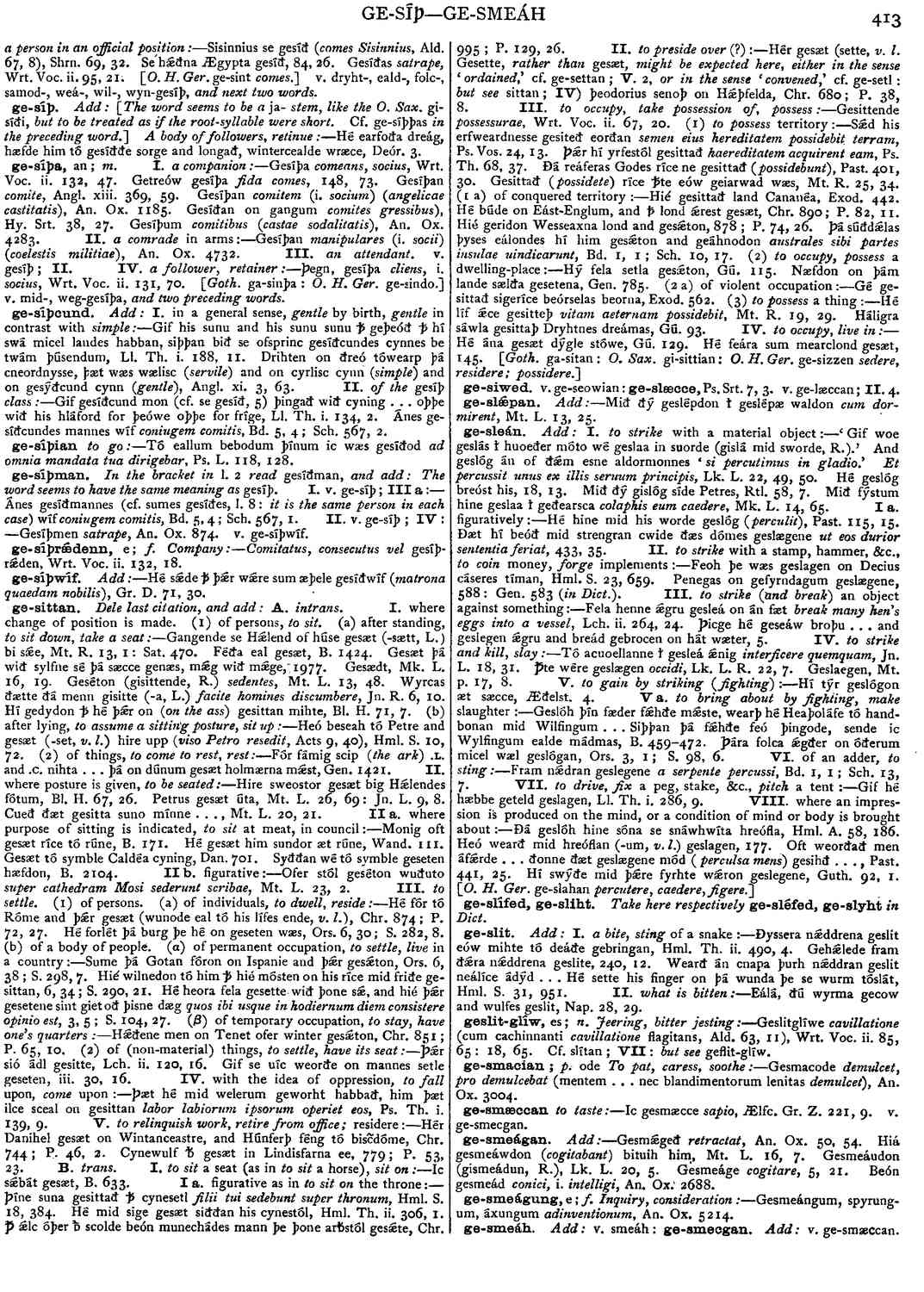ge-sittan
- verb
-
Gangende se Hǽlend of húse gesæt (-sætt,
- L. ) bi sǽe, Mt. R. 13, I: Sae. 470.
-
Féða eal gesæt,
- B. 1424.
- Gesæt þá wið sylfne sé þá sæcce genæs, mǽg wið mǽge, 1977.
-
Gesædt,
- Mk. L. 16, 19.
-
Geséton (gisittende, R.)
sedentes,
- Mt. L. 13, 48.
-
Wyrcas ðætte ðá menn gisitte (-a, L.)
facile homines discumbere,
- Jn. R. 6, 10.
-
Hí gedydon ꝥ hé þǽr on (
on the ass
) gesittan mihte,- Bl. H. 71, 7.
-
Heó beseah tó Petre and gesæt (-set, v.l.) hire upp (
viso Petro resedit,
Acts- 9, 40), Hml. S. 10, 72.
-
Fór fámig scip (
the ark
) .l. and .c. nihta . . . þá on dúnum gesæt holmærna mǽst,- Gen. 1421.
-
Hire sweostor gesæt big Hǽlendes fótum,
- Bl. H. 67, 26.
-
Petrus gesæt úta,
- Mt. L. 26, 69: Jn. L. 9, 8.
-
Cueð ðæt gesitta suno mínne . . . , Mt. L. 20, 21. II a. where purpose of sitting is indicated,
to sit
at meat, in council :-- Monig oft gesæt ríce tó rúne,- B. 171.
-
Hé gesæt him sundor æt rúne,
- Wand. III.
-
Syððan wé tó symble geseten hæfdon, B. 2104. II b. figurative :-- Ofer stól geseton wuðuto
super cathedram Mosi sederunt scribae,
- Mt. L. 23, 2.
-
Hé fór tó Róme and þǽr gesæt (wunode eal tó his lífes ende,
v.l.
),- Chr. 874 ; P. 72, 27.
-
Hé forlét þá burg þe hé on geseten wæs,
- Ors. 6, 30; S. 282, 8.
-
Sume þá Gotan fóron on Ispanie and þǽr gesǽton,
- Ors. 6, 38 ; S. 298, 7.
-
Hié wilnedon tó him ꝥ hié mósten on his ríce mid friðe gesittan,
- 6, 34; S. 290, 21.
-
Hé heora fela gesette wið þone sǽ, and hié þǽr gesetene sint gietoð þisne dæg
quos ibi usque in hodiernum diem consistere opinio est,
- 3, 5 ; S. 104, 27.
-
Hǽðene men on Tenet ofer winter gesǽton,
- Chr. 851; P. 65, 10.
-
Þǽr sió ádl gesitte,
- Lch. ii. 120, 16.
- Gif se uíc weorðe on mannes setle geseten, iii. 30, 16.
-
Þæt hé mid welerum geworht habbað, him þæt ilce sceal on gesittan
labor labiornm ipsorum operiet eos,
- Ps. Th. 139, 9.
- Hér Danihel gesæt on Wintanceastre, and Húnferþ féng tó biscdóme, Chr. 744; P. 46, 2.
-
Cynewulf b̃ gesæt in Lindisfarna ee,
- 779; P. 53, 23. B. trans.
-
Ic sǽbát gesæt,
- B. 633.
-
Þíne suna gesittað ꝥ cynesetl
filii tui sedebunt super thronum,
- Hml. S. 18, 384.
-
Hé mid sige gesæt siððan his cynestól,
- Hml. Th. ii. 306, I.
-
Þ ǽlc óþer b̃ scolde beón munechádes mann þe þone arb̃stól gesǽte,
C- hr. 995 ; P. 129, 26.
- Hér gesæt (sette, v.l. Gesette, rather than gesæt, might be expected here, either in the sense 'ordained,' cf. ge-settan ;
- Chr. 680; P. 38,
-
Gesittende
possessurae,
- Wrt. Voc. ii. 67, 20.
-
Sǽd his erfweardnesse gesiteð eorðan
semen eius hereditatem possidebit terram,
- Ps. Vos. 24, 13.
-
Þǽr hí yrfestól gesittað
haereditatem acquirent eam,
- Ps. Th. 68, 37.
-
Ðá reáferas Godes ríce ne gesittað
(possidebunt),
- Past. 401, 30.
-
Gesittað
(possidete)
ríce ꝥte eów geiarwad wæs,- Mt. R. 25, 34.
- (la) of conquered territory :-- Hié gesittað land Cananéa, Exod. 442.
-
Hé búde on Eást-Englum, and ꝥ lond ǽrest gesæt,
- Chr. 890; P. 82, II.
-
Þá súðdǽlas þyses eálondes hí him gesǽton and geáhnodon
australes sibi partes insulae uindicarunt,
- Bd. I. l ; Sch. 10, 17.
-
Hý fela setla gesǽton,
- Gú, 115.
-
Næfdon on þám lande sælða gesetena. Gen. 785. (2 a) of violent occupation :-- Gé gesittað sigeríce beórselas beorna,
- Exod. 562.
-
Hé líf ǽce gesitteþ
vitam aeternam possidebit,
- Mt. R. 19, 29.
-
Háligra sáwla gesittaþ Dryhtnes dreámas,
- GO. 93.
-
Hé ána gesæt dýgle stówe,
- Gú. 129.
- Hé feára sum mearclond gesæt, 145.
Bosworth, Joseph. “ge-sittan.” In An Anglo-Saxon Dictionary Online, edited by Thomas Northcote Toller, Christ Sean, and Ondřej Tichy. Prague: Faculty of Arts, Charles University, 2014. https://bosworthtoller.com/49699.
Checked: 0